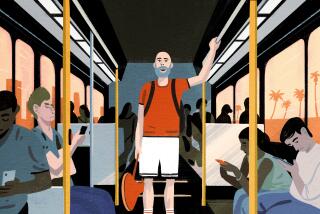Millions Will Be Missing the Bus
- Share via
In June 1964, I boarded a Greyhound bus at Port Authority in New York. Sixteen hours later, I arrived on schedule, none the worse for wear, in Winston-Salem, N.C. I was 22 years old and starting my first post- college teaching job.
Greyhound still makes the journey from Port Authority to Winston-Salem. The fare is $90 one-way during the week, $99 on weekends, and the trip is faster than it was 40 years ago. This year, Greyhound will take 19 million passengers to cities across the United States. But the oldest, largest and the busiest bus company in the country recently announced it would cut service this summer to more than 250 cities in more than a dozen states, from California to North Dakota, Nebraska to Oregon.
Sad to say, the familiar Greyhound -- an icon as recognizable perhaps as a Coca-Cola bottle -- will no longer be a fixture on Main Street and across the wide-open spaces of the West. For a lot of small towns, it will end almost a century of service, moving workers to factories and fields, soldiers to military bases and home again, families to reunions at Thanksgiving, Christmas and the Fourth of July.
When I made my journey by Greyhound in 1964, I didn’t own a car and couldn’t afford to buy one. Traveling by bus was a practical matter of dollars. But the bus was a lot more than that -- a place strangers made friends, shared food and stories, a rolling community in close quarters.
As a newly minted master’s graduate in American literature, I knew all about mythic journeys, rites of passage and male initiation rituals in novels like “Moby Dick,” “The Adventures of Huckleberry Finn” and “On the Road.” I knew, too, that Beat poet Allen Ginsberg had worked at the Greyhound terminal in San Francisco, stacking luggage and carrying suitcases. He had even written a poem about his experiences -- “In the Baggage Room at Greyhound” -- in which he describes the “millions of the poor rushing around.” Setting out from Port Authority to Winston-Salem, I envisioned myself as a hero on my own mythic journey.
The Greyhound took me overnight from the familiar world I had known to a strange, unknown world that I had only read about: the American South. On my epic trip, I met a warmhearted middle-aged African American woman who fed me and entertained me with stories about her family. When I arrived at my destination, her oldest son carried my luggage to his car and drove me to the campus of Winston-Salem State. Greyhound broke down all sorts of barriers for me and for millions of young men and women like me.
In a way, Greyhound played a part in integrating the nation. It enabled me and my contemporaries to move about the country freely, to discover the diversity as well as the inequalities and the generosities of the nation at large.
Everyone in my family has traveled by Greyhound. My youngest brother, Adam, once woke me at 3 a.m. and recounted every leg of his grueling Greyhound ride from L.A. to New York. By sunrise I felt I’d traveled with him.
For his wife, Adelina, Greyhound offered a way to get to places she had only dreamed about. And so it came to symbolize the American dream itself. Born in Mexico, she came to California as a girl and grew up in the Great Central Valley harvesting strawberries, peaches, onions and lettuce with her parents. Greyhound took her from the valley to Los Angeles and San Diego and then to college in San Francisco.
Her 70-year-old mother still travels from the valley to San Francisco by Greyhound. Once a year, Adelina takes Greyhound to remind herself of the road she’s traveled since childhood. “Greyhound,” she says, “gave me my independence and my freedom.”
For millions of Americans, Greyhound’s profit-driven decision will surely lead to increased isolation in already isolated places. It may very well make those nearly forgotten men and women long for a past when Greyhound provided a way out and a way up -- an egalitarian vehicle to greater social mobility and a vital connection to humanity itself.
More to Read
Sign up for Essential California
The most important California stories and recommendations in your inbox every morning.
You may occasionally receive promotional content from the Los Angeles Times.













